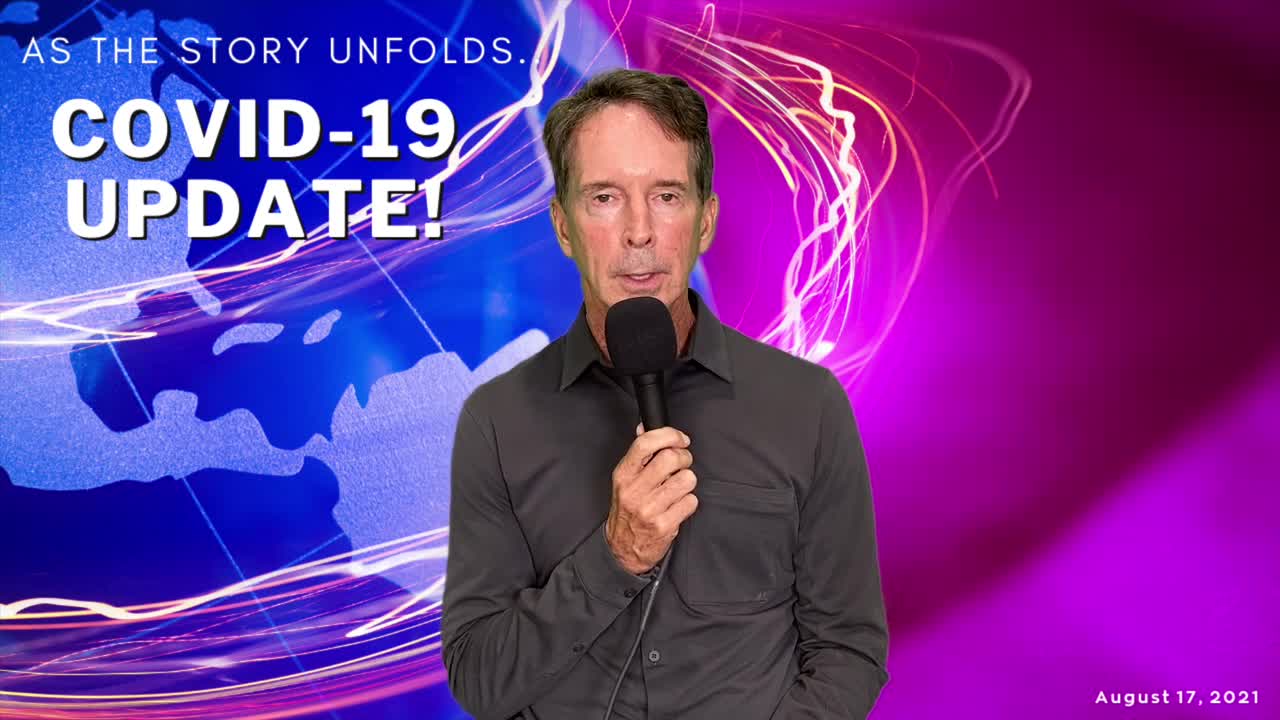Premium Only Content

The surge of the Delta Variant and his recommendations for prevention and early treatment
Performance Medicine
In this episode of the Common Sense MD, Dr. Tom Rogers talks about the surge of the Delta Variant and his recommendations for prevention and early treatment.
Link to video mentioned in podcast:
Dr. Marty Makary
Professor at Johns Hopkins University School of Medicine
Natural Immunity & COVID-19? - SmartHER News
https://www.smarthernews.com/video_po...
Obligatory Disclaimer: The use of information in this video or materials linked from this video is at the user’s own risk. The content of this video is not intended to be a substitute for professional medical advice, diagnosis, or treatment. Users should not disregard, or delay in obtaining, medical advice for any medical condition they may have, and should seek the assistance of their health care professionals for any such conditions.
00:10
hi this is dr tom rogers at performance
00:12
medicine
00:14
talking to you this week about
00:17
coven 19 update
00:19
boy do i have a lot to talk about
00:22
i'll try to keep it short as i can
00:23
though
00:24
i think that last week
00:27
was one of the most exhausting busiest
00:30
weeks i've had as a medical practitioner
00:32
of 36 years
00:34
except maybe for residency
00:36
where i'd stay up for 36 hours at a time
00:39
but um
00:40
couldn't do that now but
00:43
gosh
00:44
me and my team have treated last week
00:47
over a hundred cases of covet 19
00:49
outpatient of course by telemedicine
00:53
yesterday which was monday we treated 40
00:57
cases of covet 19.
00:59
so
00:59
i guess you could say it's kind of
01:00
surging right now
01:02
you know
01:03
what a pickler in at this point
01:06
coven 19 has been
01:08
affecting the united states for 18
01:11
months
01:12
we've had
01:14
over
01:15
190 million people get at least one
01:18
vaccination i think 170 million have
01:21
been fully vaccinated
01:24
there's been a reported 39 million
01:26
people that have had coveted
01:28
and probably double that because a lot
01:30
of them didn't know they had it
01:31
so
01:32
it seems like the majority of our
01:34
country
01:35
um
01:36
has either
01:37
been vaccinated or had the disease so
01:40
it's still surging why well the new
01:43
delta variant is probably the reason
01:46
it's surging right now it certainly
01:47
seems to be
01:49
more contagious
01:51
than the other variants so far i don't
01:54
think it's more deadly from what i've
01:57
seen and
01:58
talked to hospitalists and things
02:02
but certainly
02:04
you know we're having a lot of
02:06
breakthrough
02:07
cases meaning
02:08
uh the fully vaccinated can still get
02:12
coveted 19 which is is somewhat
02:14
surprising for us
02:16
for some of us
02:18
so
02:19
the vaccine is not as effective as at
02:22
preventing this mutation
02:24
um as we thought it would be
02:27
um
02:28
you know hopefully
02:30
it won't cause as many deaths as the
02:32
last go around when he had had a surge
02:35
that like we're having now i mean but
02:37
you know you usually think of this kind
02:39
of viruses as peaking in the the winter
02:42
and here it is the heat of the summer in
02:44
august so you know something
02:47
fishy is kind of going on and we're
02:50
learning every day new things about
02:54
you know the courses things taking
02:57
um
02:58
and well certainly myself i'm learning
03:01
about
03:02
new more aggressive ways to treat it as
03:04
an outpatient you'd much rather be
03:07
treated early as an outpatient than you
03:09
would
03:10
having to go to the hospital you know i
03:12
don't think our
03:14
cdc and our government has really led us
03:17
really entirely in the right direction
03:19
on this scene because there is
03:21
treatment uh if you treat early it's
03:23
it's off-label some of it
03:26
um but it certainly i've seen it to be
03:28
pretty effective not that there aren't
03:30
uh patients that
03:32
get early treatment and still end up
03:34
going to the hospital but i think early
03:36
treatment is
03:39
not going to hurt you and it's
03:40
definitely
03:41
if you get cold
03:43
you want to do anything you can
03:45
to avoid going to the hospital
03:47
i mean the hospital is is a place where
03:50
thank goodness it's a safe haven for the
03:53
most part and
03:54
you know it should be a place to go if
03:57
if you need to go there
03:59
certainly you don't need to go there if
04:02
you think you have
04:04
just have covet 19 and want to get
04:06
tested you should go to one of the
04:08
the outpatient
04:10
facilities or even your local drug
04:12
drugstore that test outside of the the
04:15
office to see if you have coven 19 if
04:17
you have symptoms
04:19
and pretty much if you have
04:21
sore throat runny nose cough
04:24
flu-like illness you probably have
04:26
coveted 19. i encourage you to get the
04:29
test
04:30
even the even though the test is not 100
04:32
accurate by any means
04:34
way
04:35
away from that but still you have kind
04:38
of an idea with what you're dealing with
04:41
so you get a lot of false negatives you
04:43
get some false positives of course
04:45
um a lot of it's very complex on the
04:48
cycle threshold you know they keep
04:50
changing that and
04:52
you know a lot of the data you can't
04:53
really rely on that you're hearing in
04:55
the news
04:57
but
04:58
there's one day
04:59
one data point i'll tell you covet is
05:01
for real there's no doubt about that
05:05
and
05:07
if you notice if you look at the
05:09
pictures and follow the data look on
05:11
your local news or evening news
05:14
the people that are
05:16
getting really sick getting on
05:18
ventilators may be dying to this
05:21
are
05:22
people people a lot of comorbidities now
05:24
there are exceptions of course like
05:26
there are exceptions to anything
05:28
but
05:29
um for the most part
05:31
at least 75 percent of people that have
05:34
to be hospitalized with this are obese
05:39
at least 80 percent of them have low
05:41
vitamin d levels
05:42
and
05:43
of course a lot of them are elderly now
05:47
you know there's apparently more
05:48
children going to the hospital with this
05:52
and you know they're scaring a lot of
05:53
parents and kids alike
05:55
and but the fact is that
05:58
usually if a kid has to be sick enough
06:00
to be in the unit with it um
06:02
he is he or she is um
06:07
usually saddled with a comorbidity like
06:09
obesity you know our our country's obese
06:12
our kids are obese there's a ton of
06:14
diabetics out there
06:16
um
06:17
you know
06:18
a lot of our adults of course have heart
06:20
disease
06:21
um kidney disease a lot of lifestyle
06:23
diseases that
06:25
um they're not emphasizing this which is
06:27
this is a perfect
06:29
opportunity and we've really been
06:30
exposed in this country um of our
06:34
obesity epidemic this is our main
06:36
problem in our country is just obese
06:38
people and
06:39
immunocompromised because they don't eat
06:41
right they don't move enough they're
06:43
stressed
06:44
um
06:45
you know
06:46
a lot of us are walking around like time
06:48
bombs you know see it in my office every
06:50
day
06:52
but so
06:53
um
06:54
we know what the root cause of the
06:55
problem is you've got a
06:57
poorly functioned innate immune system
07:01
i just read a great expose by
07:03
dr johns hopkins
07:05
and um
07:06
i'll try to get that link for you but um
07:10
he's kind of a forward thinker and um
07:13
he's too big a fish to kind of censor
07:15
like they're doing a lot of the other
07:16
docs that are treating a lot of this and
07:18
have their own opinions on it but um
07:22
and i'll try to get you that link but
07:25
he of course thinks that obesity is the
07:27
main problem and that
07:30
he has a lot of other ideas like he
07:33
doesn't believe that kids uh need to
07:35
wear a mask he states that there's never
07:38
been a transm a known transmission from
07:40
a pupil to a teacher
07:43
he also doesn't think kids should be
07:46
uh need to be vaccinated unless they
07:48
have
07:49
a lot of cobor comorbid uh diseases
07:52
along with it um
07:55
in fact he doesn't think that
07:58
people that are younger under 50 and
08:01
healthy necessarily need the vaccine now
08:03
he
08:04
he's for the vaccine
08:06
but
08:07
more than people that really need it and
08:10
i'm personally i'm not against a vaccine
08:13
for people that need it there are people
08:14
that need it like elderly people nursing
08:17
home people
08:18
maybe health care workers that are
08:20
exposed to it
08:22
diabetics
08:24
[Music]
08:25
people with heart disease and cancer
08:28
uh certainly uh
08:30
morbidly obese people um who won't do
08:33
well with the virus um
08:35
but there's there's a lot of simple
08:37
things you can do to kind of protect
08:39
yourself from this virus like eating
08:42
right exercising taking vitamin d
08:45
taking zinc
08:46
taking vitamin c
08:50
and there's a few others like quercetin
08:52
and nak that i certainly have been
08:53
taking
08:55
another thing i do
08:56
for prevention is
08:58
x clear
09:00
nasal spray it's it's really made with
09:03
mostly xylitol which
09:05
is really anti-viral and as you know
09:07
this is a respiratory virus that gets in
09:09
through your nose and maybe through your
09:11
eyes and mouth mucous membranes
09:13
so and use a
09:14
mouthwash gargle that gets rid of a lot
09:17
of
09:17
bacteria and virus in itself so and of
09:20
course use your hand washing techniques
09:23
and if you're sick
09:25
stay out of school stay at home from
09:27
work don't expose to other people there
09:29
are some
09:30
asymptomatic spread but certainly not as
09:33
dangerous as somebody who has uh who's
09:35
coughing and you know obviously sick
09:39
so those people should use mass for sure
09:41
and just stay at home
09:43
um there's a lot of other preventive
09:45
things that we've been doing
09:48
uh for many many months and i guess a
09:52
year and a half
09:53
and
09:54
of course i'm talking about use of
09:56
ivermectin
09:58
which i'm really big on i myself my
10:01
whole family been taking it for a year
10:02
now once a week and now i will admit i'm
10:05
taking it twice a week because this
10:07
thing is surging i've also doubled my
10:10
vitamin d
10:11
now my vitamin c and i stay with about
10:13
50 milligram of zinc
10:16
and i also take quarston there's a
10:18
couple other things you can do like
10:20
uh take an h1 and an h2 blocker like
10:24
pepcid ac
10:25
and azir tech i think that's helpful
10:28
um
10:29
you know and of course move around get
10:31
outside exercise eat right don't eat
10:35
sugar sugar is too inflammatory this is
10:37
an inflammatory lung disease that we're
10:39
talking about
10:41
um
10:42
so
10:43
there's a lot of controversy about this
10:47
disease about the vaccine the bottom
10:50
line is you need to take care of
10:52
yourself and your health you know i
10:54
think if you do that you know you can
10:56
ride through this now i've learned a lot
10:59
of things about treating this as an
11:01
outpatient and certainly if you can
11:04
you'd certainly rather get early
11:05
outpatient treatment than you would to
11:08
end up in the hospital or where you may
11:10
be waiting on a gurney in the outside
11:13
the emergency room for a day or two i've
11:14
seen that many times there's just not
11:17
enough hospital staff to cover this
11:18
right now
11:19
you know there's a huge nursing shortage
11:22
and um
11:23
you know we've lost a lot of
11:25
good nurses because they just realize
11:28
it's not for them
11:30
doctors too healthcare workers they're
11:32
scared there's a lot of fear
11:35
behind
11:37
a lot of what we're seeing right now
11:40
if you see somebody in a car with a mask
11:42
on by themselves or riding their bike
11:44
down the creeper trail with a mask on
11:46
that's just a symbol of fear
11:48
that's all it is
11:49
uh but anyway what i've learned about um
11:53
outpatient treatment is that we're
11:55
becoming more aggressive with outpatient
11:58
treatment
11:59
and that means
12:01
higher doses earlier of ivermectin
12:05
sometimes i will use hydroxychloroquine
12:07
i think iver mexicans may be a little
12:09
more safer probably less controversial
12:13
and it's inexpensive and it works
12:16
against viruses although it is a
12:19
medicine for parasites heck we've been
12:20
using it for years it's won the nobel
12:22
prize it's one of the most
12:25
valued
12:26
drugs in history
12:29
so and it's very safe
12:32
so
12:33
hydroxychloroquine i think it works too
12:36
um i think that
12:39
we need to be on an antibiotic for most
12:41
of these people zithromax or
12:43
doxycycline are my choices
12:45
um
12:46
we're certainly using high dose vitamin
12:49
d we're using high dose vitamin c zinc
12:52
of course which is is something that
12:54
kills a virus actually the quercetin
12:58
and the hydroxychloroquine can get the
13:00
zinc into the cell to kill it
13:03
but
13:04
but anyway we use a lot of other
13:05
modalities like i've talked about um we
13:08
usually put some mind on a blood thinner
13:10
usually aspirin sometimes
13:12
more
13:13
um
13:14
i put
13:15
several people on more potent blood
13:17
thinners if they're at risk
13:20
you know i like uh melatonin at night
13:24
uh to use that as well
13:26
um
13:28
and there's some other little things
13:29
i'll throw in now and um earlier and and
13:33
i'll use higher doses of steroids
13:35
um
13:36
you know i've learned to be pretty
13:37
aggressive with steroids of course i use
13:39
inhaled steroids a lot inhaled budesinai
13:42
it's great sometimes i use even
13:45
bronchodilators with this thing you have
13:47
to watch your oxygen concentration
13:49
through a cheap little device called a
13:51
pulse oximeter
13:54
sometimes i've sent oxygen into the home
13:58
certainly if your o2 levels in the 80s
14:00
you need to start worrying and let us
14:02
know
14:04
also monoclonal antibodies if you are
14:07
eligible now to be eligible you have to
14:09
be
14:10
meet criteria like be 65 or over have
14:14
diabetes uh have a bmi over 35
14:19
have kidney disease and i hope they get
14:22
a little more open with the use of
14:24
monoclonal antibodies
14:26
you got to treat early within the first
14:28
five days and with all this stuff you
14:29
need to treat early really um
14:32
the inpatient hospital use of rem
14:34
disavir has been kind of disappointing
14:37
um
14:38
you know and when the disease first came
14:41
came out you know
14:43
there was really too much aggressive use
14:45
of the ventilator machines i think and
14:48
i think it did a lot of harm more than
14:50
good and some people
14:52
are able to be ventilated and get off
14:54
the vent later but
14:55
it's kind of a rare thing
14:57
but there there's you always hope but
15:00
i've seen a lot of multi-organ system
15:02
failure once you get on the ventilator
15:04
in hospitalized patients um
15:08
um
15:08
i have experienced this with with loved
15:11
ones and some and some family friends
15:13
that have gone down the tubes with that
15:16
with that treatment it's usually too
15:17
late or they had co-morbid conditions
15:20
so you need to do everything you can to
15:24
prevent this and get early treatment
15:28
there is treatment that is available
15:31
early if you do and certainly i'm a big
15:33
proponent of
15:35
prophylactic ivermectin use it's
15:37
off-label but you know we can use it as
15:39
doctors we use things off label every
15:42
day every doctor does this
15:44
not every doctor knows to use
15:45
hyvermectin
15:46
but um they have many many doctors that
15:49
take this especially ones that are on
15:51
the front lines
15:53
you know that i've seen this disease
15:55
uh run its course from not knowing you
15:58
have it to
16:00
being a milder case in the flu for the
16:02
most part it's a milder illness than the
16:05
flu is in healthy people
16:07
but
16:08
for those that aren't and for those
16:11
outliers
16:12
that may have a predisposed genetic uh
16:15
condition then they can go down the
16:17
tubes pretty rapidly so we need to be
16:20
aggressive with this um i hope that
16:23
you know
16:24
our country and our world learns a
16:26
lesson from this and that that is we
16:29
need to focus on preventive medicine
16:31
you know not reactive medicine and
16:34
and
16:35
you know treating with too many drugs as
16:38
i mentioned many times before
16:40
medical error is the third leading cause
16:42
of death in this country right behind
16:44
heart disease and cancer
16:46
so um you know i'm really big on
16:50
preventive medicine i've i've seen the
16:52
nuances of medicine through
16:55
you know my 66 years on earth through my
16:57
father being a physician
16:59
myself for 36 years or more my brother
17:03
tons of uncles
17:05
grandparents and
17:07
cousins who are physicians as well as
17:08
well as other types of providers so
17:12
you know i'm going to keep you updated i
17:14
have an open mind this is an
17:16
ever-changing story with covid and i'm
17:19
certainly digging deep with code this
17:21
has been the challenge of a lifetime for
17:23
me and for almost any healthcare
17:25
provider right now is is trying to
17:28
figure this thing out and prevent this
17:30
thing from shutting down everything
17:31
again
17:32
you know it really didn't the lockdowns
17:34
really didn't work before they won't
17:36
work again
17:37
um
17:38
and i just hope it's not headed toward
17:40
that towards that
17:42
as far as the vaccines you know you
17:43
can't say a lot about them
17:45
you need to make your own choice if the
17:48
benefits outweigh the risk
17:50
then you should take the vaccine
17:53
if the risks outweigh the benefits then
17:55
you shouldn't take the vaccine it should
17:57
be your own private decision
17:59
informed decision
18:01
so
18:02
um
18:03
you know in the aforementioned in the
18:05
earlier piece of the podcast about who
18:08
should who i think shouldn't get the
18:11
vaccine
18:12
are
18:13
people that are healthy that you know
18:16
are lean they eat right they're healthy
18:18
you know they probably don't need it um
18:22
certainly people at risk need it
18:24
personal opinion is kids really don't
18:26
need it unless they have co-morbid
18:28
conditions i mean
18:29
you know what they're doing now is
18:31
giving
18:32
a 12 year old
18:34
70 80 pound girl the same dose as a 200
18:38
pound man
18:39
that doesn't make sense to me
18:41
it's not common sense and i think that's
18:43
why we're seeing so much myocarditis
18:46
from the vaccine in kids
18:48
certainly the adverse events are being
18:51
under reported no doubt about that
18:55
so um the disease getting the disease is
18:58
risky sometimes the vaccine for certain
19:00
people
19:01
is risky um but certainly in some people
19:04
the benefits are going to outweigh the
19:06
risk so i'm not totally anti-vaccine on
19:09
this thing so i don't want to get that
19:11
opinion
19:12
but certainly it's a self-choice and you
19:15
need to weigh your risk and think about
19:16
it
19:18
but
19:19
there is treatment for this
19:21
bottom line is
19:23
take your vitamin d eat right think
19:26
about your own health
19:28
and you know contact somebody who
19:31
likes early
19:33
outpatient treatment of this thing and
19:35
certainly get tested if you have
19:37
symptoms
19:39
i hope to keep you updated throughout
19:41
the course of this pandemic
19:44
we're following just a ton of patients
19:46
as i mentioned
19:48
we saw over 100 patients last week with
19:52
cove and do cases of covid
19:54
besides all the long cove that we're
19:56
already treating long haulers and
19:59
yesterday monday
20:01
we saw 40 coveted patients or
20:04
tell by telemedicine visit you know we
20:06
we don't we can't have people coming
20:08
into our office with covet and
20:10
telemedicine has certainly
20:11
been a great thing for us and for
20:14
for all of medicine we're able to treat
20:16
a lot of stuff outpatient
20:18
uh and where everybody's safe or more
20:20
comfortable it's certainly more
20:21
convenient um we've worked out a system
20:24
of protocol
20:25
for approaching prevention and treatment
20:28
of covet 19. so
20:30
stay tuned you know i'm always trying to
20:32
be optimistic about everything even
20:34
though
20:35
you know it seems like our country is
20:38
more divided than it is united like it
20:40
should be
20:41
um so just stay tuned and i'll hopefully
20:44
keep
20:45
uh
20:46
people that listen to this podcast
20:48
updated as much as i can and certainly
20:50
you can contact one of our offices if
20:52
you want a
20:53
telemedicine visit
20:55
for further guidance or treatment uh
20:57
thank you i'll talk to you next week
21:04
[Music]
21:12
you
-
 10:19
10:19
MattMorseTV
1 day ago $8.68 earnedTrump just went SCORCHED EARTH.
48.7K55 -
 1:36:49
1:36:49
RiftTV
2 hours agoHow Much is the Government SPYING on You and STEALING Your DATA?! | Almost Serious | Guest: Matt Kim
2.45K1 -
 1:31:26
1:31:26
Glenn Greenwald
3 hours agoAaron Maté on More Russiagate Fallout, Protests in Ukraine, and Israel's Strikes on Syria With Special Guests John Solomon, Marta Havryshko, and Joshua Landis | SYSTEM UPDATE #491
83.6K16 -
 LIVE
LIVE
Melonie Mac
2 hours agoGo Boom Live Ep 56!
361 watching -
 LIVE
LIVE
Joker Effect
20 minutes agoWHY AREN'T YOU DOING THE RUMBLE CREATOR PROGRAM...? IT BEGINS HERE. Wake up!
304 watching -
 LIVE
LIVE
Jorba4
3 hours ago🔴Live-Jorba4- Rainbow 6 Siege w/ XxXAztecWarrior and Zerrick Gaming
38 watching -
 1:33:40
1:33:40
Mally_Mouse
9 hours agoLet's Hang!! - P.O. Box & Chill - WE HIT 10,000!!!
9.98K3 -
 1:07:08
1:07:08
Playback Request Live
1 hour agoFrom Myspace to Rumble: Supmikecheck in the Creator Spotlight
2.8K1 -
 LIVE
LIVE
Geeks + Gamers
36 minutes agoGeeks+Gamers Play- MARIO KART WORLD!
73 watching -
 LIVE
LIVE
Clenzd Gaming
47 minutes agoDad Ranked Grind
5 watching